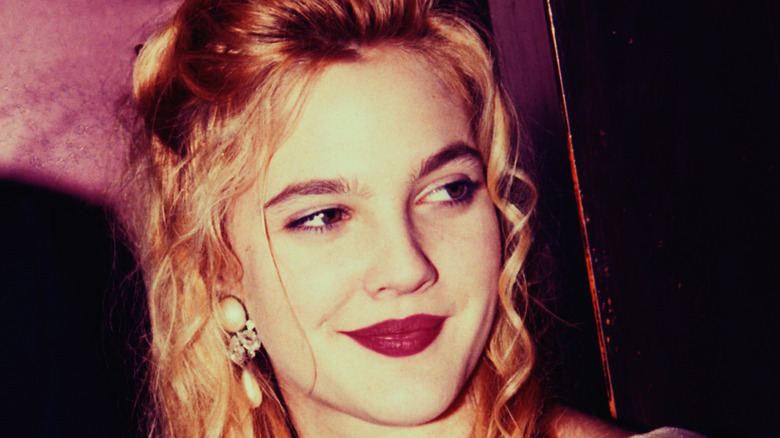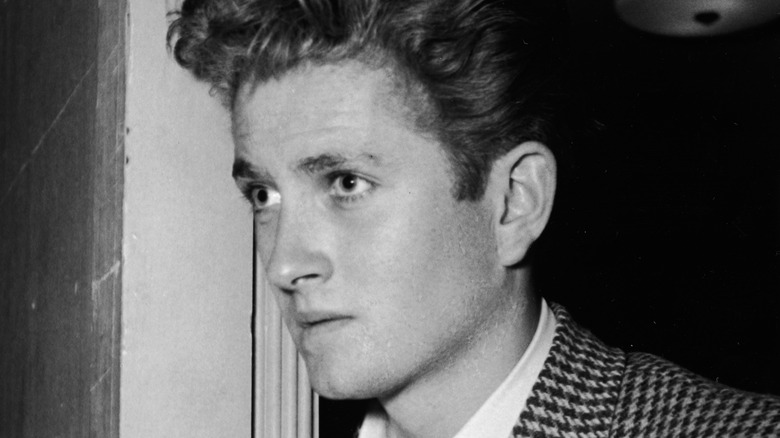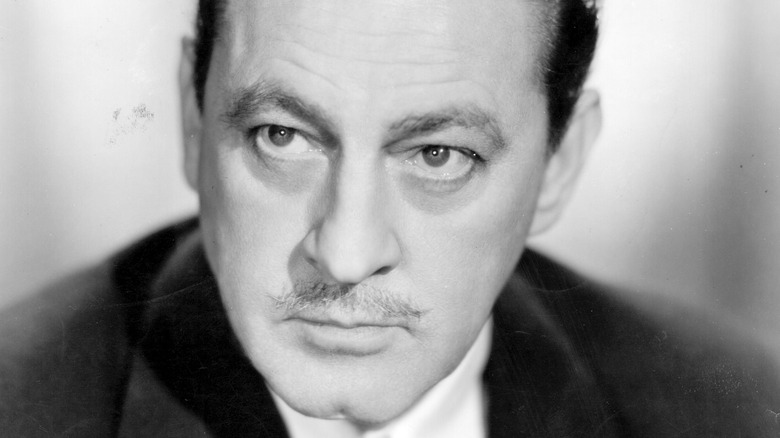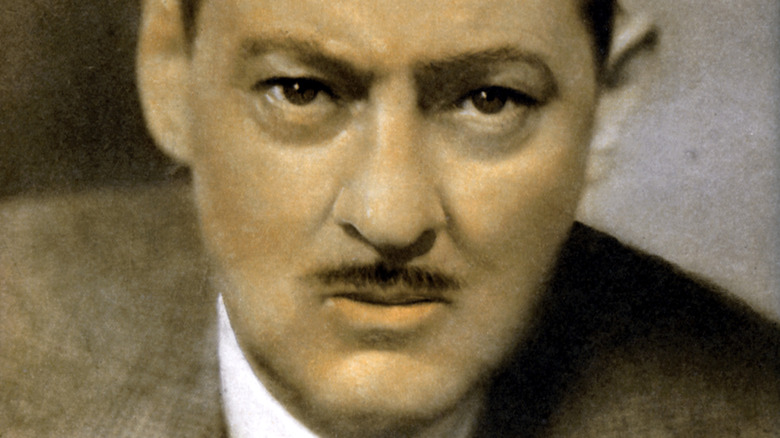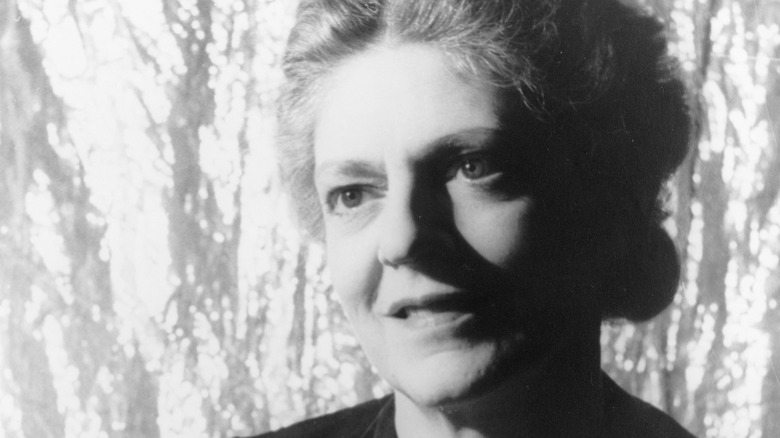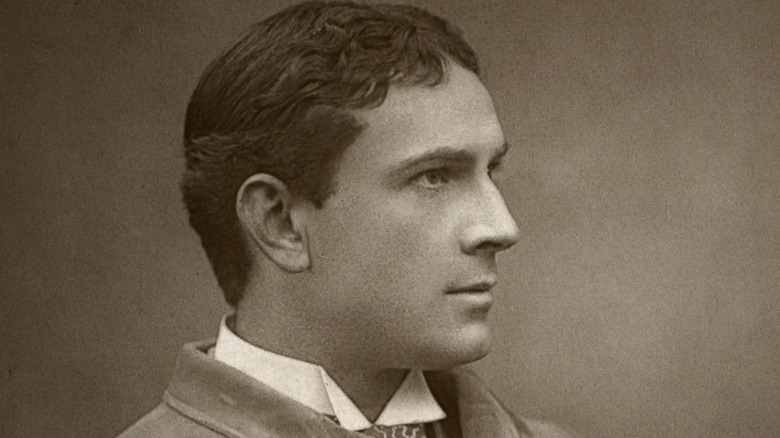Drew Barrymore's Famous Family Tree Explained
Drew Barrymore is part of the famous Barrymore family, which has been involved in film and theater for more than 150 years (or longer, according to some sources). If you follow the Drew side of her family — Drew was a maternal surname within her family line before it became her first name — the acting line goes back even farther, 200 years or longer (via Britannica). And that's only her pedigree by blood — she's also the goddaughter of director Steven Spielberg (via Us Weekly). That's right: generations of acting talent went into the woman who now sunnily rubs out stains and talks to psychic mediums on her syndicated talk show (via The New York Times).
Since Drew is probably the most famous Barrymore alive today, it can be confusing trying to figure out all the various family ties. How did they get into the performing arts, and why did Drew end up joining the family business as a little girl in "E.T.: The Extra-Terrestrial"? Let's start with Drew's parents.
Her dad was a television actor
Drew Barrymore was born to two actors, John Drew Barrymore and Ildiko Jaid Mako Barrymore. Her father began his career in films like "The Sundowners" and "Thunderbirds," but was greeted with bad reviews (via Film Buff Online). Later, he occasionally appeared in Western television shows such as "Rawhide" and "Gunsmoke."
But John Barrymore struggled with addiction. The Actors Equity suspended him twice within the span of five years for bad behavior on set — he even reportedly never showed up for a "Star Trek" episode he had been cast in (via Star Trek Fact Check). By the mid-'60s, he was in and out of jail on charges of speeding, drunk driving, marijuana possession, and domestic violence (via The Los Angeles Times). In her memoir "Little Girl Lost," Drew Barrymore remembers her childhood relationship with her father as distant, "very abusive and just chaotic." He died in 2004.
Drew's mother, too, was an actor, though not a very prolific one (via IMDb). Born in a refugee camp in Germany, Jaid Barrymore mostly worked as her daughter's manager — and enabler (via The Guardian). The Barrymore mother and daughter were partying at Studio 54 from the time Drew was 8 years old, leading to addiction problems for the child star before she was a teenager. By the time she was 14, Barrymore famously became completely and legally emancipated from her parents.
Her grandfather was a classic Hollywood actor
John Drew Barrymore's father was also called John Barrymore, but his career was far more successful than that of his son (via Britannica). As a stage actor, he performed in the title roles of "Hamlet" and "Richard III," and became a movie star in the '20s and '30s with films like "Grand Hotel," "Dinner at Eight," "Midnight," "Twentieth Century," the 1925 version of "Ben-Hur," "Romeo and Juliet," and "Rasputin and the Empress," the latter of which he acted in with his siblings Lionel and Ethel.
Known as "The Great Profile," Barrymore's career remained distinguished until his struggles with alcoholism became public knowledge. By the time leading up to his death, from pneumonia and cirrhosis of the liver at the age of 60, his biggest roles came from spoofing his own image (via Hollywood's Golden Age). After his death, he still remained the life of the party — his friends stole his corpse from the morgue to have one last bash with their friend, according to no less a source than his granddaughter Drew (via New York Daily News).
Her great-uncle Lionel was in a Christmas classic
Though John was a successful actor, his older siblings Lionel and Ethel outdid him in one respect: they both received Academy Awards. Lionel Barrymore won Best Actor for playing Stephen Ashe in "A Free Soul" (via Academy Awards Database). If John was the leading man, Lionel was the happy character actor with a stern face and a stooped back — you may remember him as the villainous Mr. Potter in the Christmas movie "It's A Wonderful Life," or as Otto Kringelein in "Grand Hotel" alongside his brother (via IMDB). Later, due to injuries and chronic arthritis (according to Britannica), Barrymore would frequently act from a wheelchair, in what has been seen as a breakthrough for actors with disabilities (via Times of San Diego).
He also appeared on Broadway in plays like "Peter Ibbetson," "The Copperhead," and "The Jest"; painted and sketched; performed as Scrooge in an annual radio version of "A Christmas Carol"; composed music; and wrote an autobiography, "We Barrymores."
Her great-aunt was the "First Lady" in American theater
Ethel Barrymore's long and highly successful acting career began on stage when she was just a teenager, in 1894, according to Britannica. By the time of her death, she was so well-regarded that she was held to be the "First Lady" of American theater. She was such a huge dramatic star that the Shubert family, who developed much of Broadway, offered to name a theater after her if she agreed to star in a performance there (via Playbill). She accepted, and subsequently starred in "The Kingdom of God," the first play at the Ethel Barrymore Theatre; the theater is still open to this day.
Like her brothers, Ethel was also a movie star. She received four Academy Award nominations for acting, winning one for playing Ma Motte in "None but the Lonely Heart" (via Oscars), opposite Cary Grant. All of these nominations came in the 1940s, decades into her career.
Her great-grandfather disappointed his parents
Drew Barrymore's great-grandfather Maurice Barrymore was born Edward Blythe in India to British parents, with a father who worked for the British East India Company, according to Britannica. His parents hoped he'd become a lawyer; instead, Maurice became a boxer, and then an actor, sometimes acting with other members of his family. One of them was his wife, Georgiana Drew, also an actor, whom he met while performing in Augustin Daly's famed theater company.
Of the couple, Georgiana was the bigger star, appearing in hits like "As You Like It," "Pique," and "The Senator," which ran for almost two years with her in the lead. She co-starred with the other lead actors of the day, including Helena Modjeska and Edwin Booth (yes, the brother of John Wilkes Booth). Georgiana's career, however, was sadly cut short in 1893, when she died of tuberculosis in her late 30s (via The New York Times).
